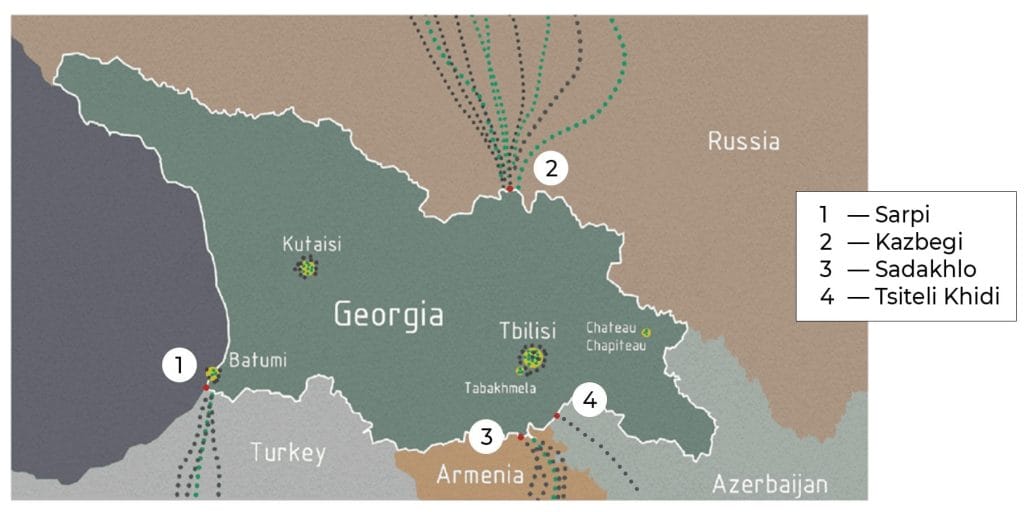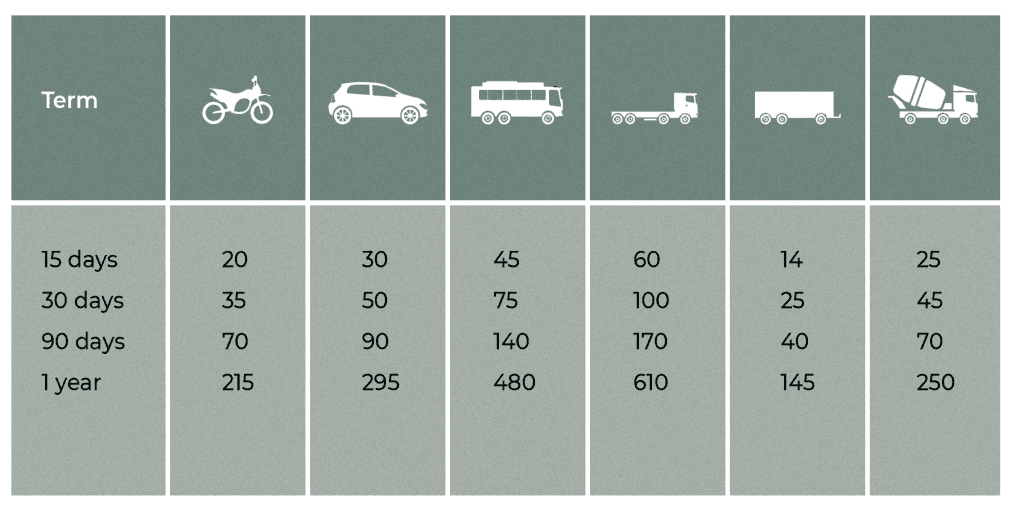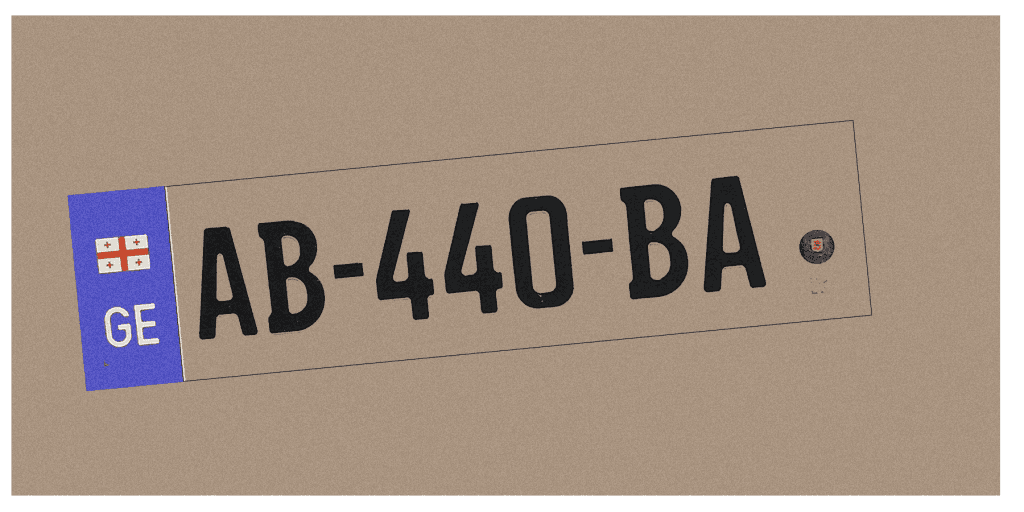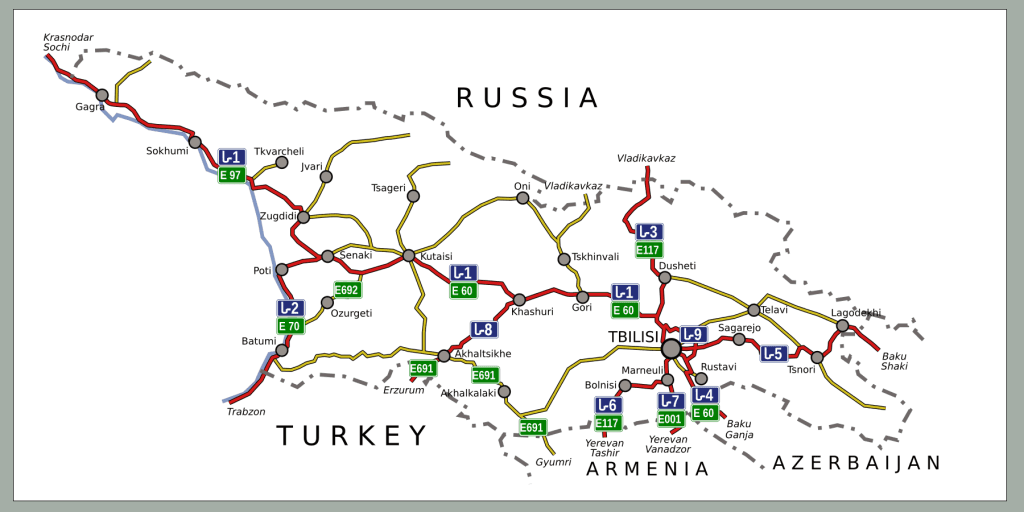Georgia has been blessed with some striking countryside, and if the Georgian Auto-Moto Tourism Federation (and European experience) is to be believed, there’s great (read: billions of dollars’ worth of) potential for development. Indeed, a fairly even distribution of natural beauty, UNESCO sites, and authentic habitations make getting to know the country by car a tempting and convenient option. And there’s no reason for current legislation to be a hindrance.
Border crossings
Georgia shares a border of 1,814 km with Armenia, Azerbaijan, Russia, and Turkey, with several crossings for cars, all open 24/7.
- There are five crossings from Azerbaijan: Red Bridge (Tsiteli Khidi), Tsodna, Abreshumis Gza (historically linked to the Silk Road), Vakhtangisi, and Samtatskaro (and another one’s one the way). Red Bridge, on the Baku-Tbilisi highway, is the most popular. Important note: Azerbaijan closed its land borders to entry in 2020, and they remain closed today, though foreigners are allowed to leave the country by them (don’t let the door hit you on the way out)
- The Armenian border crossings are: Sadakhlo, Guguti, Ninotsminda, and Akhkerpi. The most popular (and easiest) route connecting Yerevan and Tbilisi passes through Sadakhlo
- Enter Georgia by car from Turkey in Sarpi, Vale, and Kartsakhi. The most popular is Sarpi, which connects the Turkish city of Khopa with Batumi, with 23.5% of tourists – almost 1.45 million people – availing themselves of this crossing in 2023
- It’s a bit different with Russia (because of course). There’s only one crossing: Verkhny Lars. The road connects Vladikavkaz, Stepantsminda (Kazbegi), and Tbilisi
Careful! You can find mention of other checkpoints with Russia, but you will be entering illegally! There aren’t any Georgian border guards at Gantiadi – Adler (from Abkhazia) and Roki – Nizhny Zaramag (from South Ossetia). Enter the country like this, and you will find yourself in a pickle. Fines, deportation, or worse… Just don’t

Can I enter Georgia if I’m a citizen of…
Foreign nationals from 90+ countries can stay in Georgia for a year without a visa. To see the full list, check out the website of the Ministry of Foreign Affairs. If you’re still not sure, take their short Do I need a visa? questionnaire.
Or try Timatic – airlines use it to verify passenger documents before check-in. Simply enter the countries of departure and arrival, your passport type, and nationality. The system will tell you what documents you’ll need at the border (the same rules apply for crossing the border by land as by air).
If you do need a Georgian visa, check out an article we have on it here.
The documents you’ll need to take your own car
- A passport
- A visa (if required)
- Your driver’s license
- A certificate of vehicle registration
- OSAGO insurance for Georgia
The last point is mandatory for all car owners who are registered in a foreign country. You can buy insurance in advance on the TPL.GE website or at a Compulsory Insurance Center or local dealer just over the border (usually a tad more expensive). The cost depends on your car and how long you’ll be staying in Georgia (15, 30, 90, 365 days). Prices vary from GEL 20 (for a motorcycle for 15 days) to GEL 610 (for a truck for a year – if you have a trailer, it’ll cost you extra…).
If your home country has ratified the Vienna Convention on Road Traffic – like Georgia – a national driver’s license is all you need, no translation required. It will be valid for one year after crossing the border. Otherwise – better get an international driver’s license.

Cost by vehicle and length of stay
Medical and accident insurance for travelers is a recent adoption, under Article 12 of the Georgia Law on Tourism, and was originally supposed to take effect on June 1, 2024, before being postponed until January 1, 2026, at the eleventh hour. The ball is now in the National Tourism Administration’s court to issue a decree spelling out the rules for traveler’s insurance.
As of the moment this is being written, medical insurance is not compulsory, though you might consider getting it anyway. Depending on where you go, they may try to fleece you, especially if you have kids. On the other hand, I’ve been to some good local clinics where treatment (for adults, anyway) costs less than the price of insurance, so…
Is it possible to enter Georgia by car with a power of attorney?
The short answer is yes. You will need the same documents already listed above, as well as a document confirming that you are driving legally.
Usually such a document is a notarized power of attorney with the right to take the car out of the country of registration, and this is an important nuance. If the owner is in the car, however (riding shotgun, for example), a power of attorney is not needed.
What’s the deal with temporary Georgian license plates?
The largess that allows car owners from 90+ countries to stay in Georgia for up to a year does not extend to their cars – the limit is 90 days. To reset the time limit, though, it’s as easy as crossing the border again. On the other hand, you could just get temporary Georgian license plates, valid for three years.
Getting temporary plates will include:
- Contacting the Service Agency of the Georgian Ministry of Internal Affairs, responsible for car registration (and certificates, licenses, weapons, and…). The usual recommendation for expats is the office in Rustavi at Red Bridge Highway 21 km. For a list of addresses in other cities, click here
- Filling out a sample application form (the staff may help you – they can often be helpful, especially if you smile and ask politely and somewhat abjectly)
- Providing a passport and the documents for your car
- Paying the fees. A certificate will cost GEL 100, and the going price for license plates is about GEL 80, though the final amount depends on how cool the license plate is. The whole procedure from the time you arrive to the time your car is entered into the unified database and you’re good to go takes just 1-2 hours
Attention: After getting your temporary Georgian license plates, you’ll have to pass a technical inspection at one of the PTI (Periodic Technical Inspection) stations within 30 days – there’s a list of centers here (you could make an appointment, though honestly, I did once, and all my friends laughed at me – the cool kids just show up, you don’t need an appointment). It’s not free – the pleasure of the experience will set you back GEL 60.
Your original license plates will wait for you at the Ministry of Internal Affairs until you decide you’ve had enough, and you’re ready to go. After the license plates have been returned, you will have 45 days to leave Georgia (you can’t leave with Georgian license plates).

What paperwork is there to bring my pets?
Georgian legislation defines pets as cats (Felis silvestris catus), dogs (Canis lupus familiaris), and ferrets (Mustela putorius furo). For these, updated import rules, based on EU regulations, have been in effect since 2023. You will need:
- A FDX-B or HDX protocol microchip
- A veterinary passport with information on pet and owner
- A veterinary certificate for the non-commercial movement of an animal (known as a Health Certificate). They’re usually issued at border veterinary control in the country of departure, and is essentially the same as the Eurocertificate. Other certificates similar in meaning can also be used
- The animal must be vaccinated against rabies and should really be vaccinated for other things too, but after chipping
- The pet must be treated with a broad-spectrum anthelminthic agent against external and internal parasites
- Rabies antibody titers (FAVN, rabies antibody, titration, rabies serology) are also required. You can get them 30 days after vaccination, but they are valid for life if you revaccinate against rabies every year
If you are traveling with rabbits, you need vaccinations against myxomatosis and GVHD instead of the rabies vaccine (though everything else is the same). Rodents and birds, on the other hand, do not need to be vaccinated, though they do require 30-day quarantine before traveling. An avian influenza test is needed (in some cases) for birds.
Obviously, the list and order of documents depends on the country you’re coming from. Azerbaijan and Turkey, for example, require a health certificate and their own exit certificate, and in Russia you need a certificate in form 5a, which is then changed to Health Certificate. Some general advice: start preparing for your trip well in advance (several months, if possible). Study the legal regulations or contact a qualified veterinary clinic. You’ll need more than a few days to get the paperwork done.
One person can bring a maximum of five pets with them at a time. The exception is if you’re bringing your furry friends into Georgia for an animal competition.
What can I (and can’t I) bring into Georgia?
The procedure for importing goods is established by the Customs Code of Georgia. Restrictions on medicines can be found in a separate law, and general guidelines are also available in this memo on the Revenue Service website.
What exactly you can carry in your car:
- Up to 10 liters of gasoline in canisters
- Up to 200 cigarettes, meaning just one carton
- Up to 4 liters of wine and 16 liters of beer. The limit is 2 liters for liquor under 22% and 1 liter for spirits over 22%
- Foodstuffs up to GEL 500 and weighing up to 30 kg. Limits are similar for non-food products. Having said that, border guards do not usually require a declaration for expensive equipment intended for personal use
As for cash: You don’t need to declare anything up to GEL 30,000 (or equivalent in another currency). Be mindful, though, that if you’re traveling by car the maximum you can carry out through the green corridor with Turkey, Armenia, Russia, or Azerbaijan is $10,000.

Did you know about these fines? You should
- The 2008 law On Occupied Territories designates a fine of up to GEL 5,000 or 5 years in prison for entering Abkhazia or South Ossetia through somewhere other than Georgia. The only way you can legally get from Russia to Georgia by car is through Verkhny Lars.
- You can get an administrative fine of GEL 100-200 for failing to take out liability insurance even if the car is parked in a parking lot.
- The fine for each day a car with foreign license plates is in Georgia beyond the permitted 90 days is GEL 50 (to a maximum of GEL 1,000).
- The fine stipulated in Article 118 of the Code of Administrative Violations for having temporary Georgian license plates without passing the technical inspection is GEL 50. That increases to GEL 150 if it’s not paid in 30 days, and then GEL 300 in another 30, and GEL 500 in another 30… Come on, just pay the fine!
There are real police and cameras monitoring violations on the roads and a so-called 100-point system with deductions for each traffic violation. Use up all 100 points, and you’re going to have problems with your license. All fines are prescribed in the 125th article of the mentioned Code of Administrative Offenses. Here are some highlights:
- Using a phone while driving (hands-free excepted) – GEL 30
- Exceeding the speed limit by 15-40 km/h – GEL 50. Exceeding the speed limit by more than 40 km/h – GEL 300. The permitted speed in populated areas is usually 60 km/h, on highways and highways – from 80 to 110 km/h.
- Driver or front passenger seatbelt – GEL 40. Same price for failing to yield to a pedestrian at a crosswalk
- Running a red light, passing where you shouldn’t be, or parking where you shouldn’t – GEL 50
- The fine is GEL 250 for leaving the scene of an accident and GEL 300 for not stopping when the police ask you to
- Drive drunk and lose your license for 6 months to a year. Permissible blood alcohol is 0.3 ppm (roughly one glass of wine for somebody who’s 70 kg)
- Finally, driving without a driver’s license or with an expired or suspended license – GEL 500
You can pay at a street terminal or bank branch. Unpaid fines are reason for preventing you from leaving the country.
A few words about road infrastructure
According to the UN, Georgia ranks 72nd for road safety out of 200 countries (its neighbors in the ranking are Uruguay, Albania, and Indonesia), so extra vigilance might be in order. The main thing is to keep calm, especially at intersections (and on mountain roads), and not to worry if there is a lot of honking. In general, it’s not a terrible place to drive.
- There is more than 41,000 kilometers of roadway in Georgia, and it’s a priority for government investment: according to TBC Capital estimates, 66% of all expenditures on infrastructure in 2017-2022 were related to roadworks
- There are almost 1.7 million registered cars
- There are 27,000 parking spots, including paid spots, in Tbilisi alone. Depending on the type of parking, the cost can vary from GEL 1 to 4 per hour. You can buy a season ticket on the Tbilisi Transportation Company website
- There are 150 E-space charging stations in Georgia, 78 of which are free of charge. There are also stations from other providers
If you have any other questions about bringing your vehicle to Georgia, sign up for a free 30-minute consultation. PB Services can help you get a power of attorney, Georgian license, purchase and sale documents, documents for the export of valuables, and much more. By the way, a residence permit opens up even more opportunities for motorists – let us tell you how to get one
